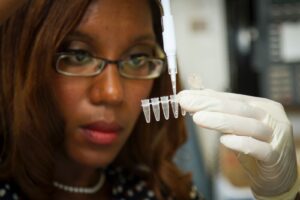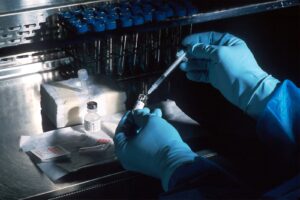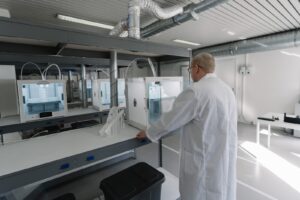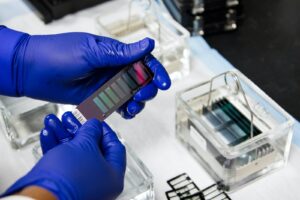Introduction
The field of biotechnology, often referred to as bio tech, is gaining significant attention due to its potential to revolutionize various industries. From healthcare to agriculture and environmental sustainability, bio tech has the power to transform the way we live. In this comprehensive blog post, we will delve into the depths of biotechnology and bio tech engineering, exploring their definitions, applications, advancements, ethical considerations, and future prospects.
Section 1: Understanding Biotechnology
1.1 Definition of Biotechnology
Biotechnology is a multidisciplinary field that involves the manipulation of biological systems for practical purposes. By combining biology, chemistry, and engineering, biotechnology seeks to develop innovative solutions to complex problems.
1.2 Key Areas of Biotechnology
Biotechnology encompasses diverse domains, each with specific applications and advancements. These areas include medical biotechnology, agricultural biotechnology, industrial biotechnology, environmental biotechnology, marine biotechnology, and bioinformatics. Let’s explore the breakthroughs in each field.
1.3 Importance of Biotechnology
Biotechnology plays a pivotal role in addressing global challenges such as disease treatment, food security, renewable energy, and environmental conservation. Its innovative solutions have the potential to enhance the quality of life and contribute to sustainable development worldwide.
Section 2: What is Bio Tech?
2.1 Defining Bio Tech
Bio tech is an abbreviation for biotechnology, encompassing all aspects of this field. It represents the broad spectrum of applications and advancements achieved through the integration of biology, chemistry, and engineering.
2.2 Bio Tech Applications
Bio tech finds applications across various industries, shaping their development and growth. It is instrumental in drug development, the creation of genetically modified organisms, crop productivity enhancement, waste management improvement, and advancements in bioinformatics. Let’s delve deeper into these applications.
2.3 Bio Tech in Healthcare

Bio tech has revolutionized healthcare, contributing to pharmaceutical development, gene therapy, personalized medicine, diagnostics, regenerative medicine, synthetic biology, and medical devices. These advancements have significantly improved disease prevention, treatment, and patient outcomes.
2.3.1 Pharmaceutical Development
The pharmaceutical industry relies on bio tech for the discovery and development of new drugs. Techniques such as high-throughput screening, combinatorial chemistry, and computer-aided drug design have accelerated the drug discovery process.
2.3.2 Gene Therapy
Gene therapy holds promise for treating genetic disorders by introducing therapeutic genes into the patient’s cells. Bio tech techniques enable the delivery of genes and their integration into the patient’s genome, potentially providing long-lasting and curative treatments.
2.3.3 Personalized Medicine

Biotech enables personalized medicine, tailoring treatments to individual patients based on their genetic makeup, lifestyle, and other factors. Genetic testing and molecular diagnostics provide valuable insights into disease susceptibility, drug response, and prognosis. This information helps healthcare professionals design personalized treatment plans, maximizing efficacy and minimizing side effects.
2.3.4 Regenerative Medicine
Regenerative medicine aims to restore or replace damaged tissues or organs through bio tech approaches. Stem cell therapy, tissue engineering, and organ transplantation advancements have the potential to revolutionize healthcare, offering solutions for conditions such as spinal cord injuries, heart disease, diabetes, and organ failure. These biotech interventions hold promise for improved patient outcomes and quality of life.
2.3.5 Medical Device Innovation
Bio tech engineering has led to remarkable advancements in medical device technology. From implantable devices to wearable sensors, these innovations aid in disease monitoring, diagnostics, drug delivery, and patient care. Biotech-powered medical devices offer more precise and personalized treatment options, enhancing healthcare delivery and patient experience.
Section 3: Advancements in Bio Tech Engineering
3.1 CRISPR-Cas9 Genome Editing
One of the most significant advancements in bio tech engineering is CRISPR-Cas9, a revolutionary genome editing tool. CRISPR-Cas9 allows scientists to precisely modify DNA sequences, opening up possibilities for treating genetic diseases, developing disease models, and enhancing crop traits.
3.2 Synthetic Biology
Synthetic biology combines engineering principles with biology to design and construct new biological parts, devices, and systems. It involves creating synthetic DNA, modifying existing organisms, and engineering new biological functions. Synthetic biology holds promise for creating novel materials, producing biofuels, and developing biosensors.
3.3 Nanobiotechnology
Nanobiotechnology involves the application of nanotechnology in bio tech. It focuses on manipulating materials at the nanoscale to develop novel tools, devices, and therapies. Nanoparticles, nanosensors, and nanomaterials have applications in drug delivery, diagnostics, imaging, and targeted therapies.
3.4 Bio-Printing

Bio-printing, also known as 3D bioprinting, enables the fabrication of three-dimensional structures using living cells, biomaterials, and bio inks. This technology has the potential to create functional tissues and organs for transplantation, drug testing, and disease modeling.
3.5 Artificial Intelligence in Bio Tech

Artificial intelligence (AI) plays a significant role in bio tech, aiding in data analysis, pattern recognition, and predictive modeling. Machine learning algorithms and AI-powered tools are employed in genomics, proteomics, drug discovery, and personalized medicine, accelerating research and development processes.
3.6 Microfluidics
Microfluidics involves the manipulation of small volumes of fluids within microchannels or microscale devices. This technology enables precise control and analysis of biological samples, leading to advancements in diagnostics, drug discovery, and point-of-care testing.
Section 4: Bio Tech and the Environment
4.1 Environmental Biotechnology

Biotech plays a crucial role in environmental conservation and sustainability. It enables bioremediation, biofertilizers, wastewater treatment, bioenergy production, carbon capture technologies, and sustainable agriculture practices. Let’s explore how bio tech is contributing to a greener future.
4.2 Agri-Biotechnology
Biotech has transformed agriculture and food production. Genetically modified crops, precision agriculture, biocontrol agents, vertical farming, and aquaculture have the potential to increase crop yields, enhance disease resistance, and reduce the environmental impact of farming practices.
4.2.1 Genetically Modified Crops
Genetically modified (GM) crops are engineered to exhibit specific traits, such as pest resistance, herbicide tolerance, and improved nutritional content. GM crops have the potential to address food security concerns, reduce pesticide use, and improve crop productivity in challenging environmental conditions.
4.2.2 Precision Agriculture
Precision agriculture utilizes bio tech tools such as remote sensing, GPS, and data analytics to optimize farming practices. By precisely managing resources such as water, fertilizers, and pesticides, precision agriculture improves efficiency, reduces waste, and minimizes the environmental impact of farming.
4.2.3 Biocontrol Agents
Biocontrol agents are beneficial organisms used to control pests and diseases in agriculture. Bio tech enables the development and deployment of biocontrol agents, reducing reliance on chemical pesticides and promoting sustainable farming practices.
4.2.4 Vertical Farming
Vertical farming involves the cultivation of plants in vertically stacked layers, using controlled environment agriculture techniques. Bio tech plays a crucial role in vertical farming by enabling optimized lighting, automated systems, and efficient nutrient delivery, resulting in higher crop yields and reduced land use.
4.2.5 Aquaculture
Bio tech advancements contribute to sustainable aquaculture practices. Through genetic improvement, disease control, and feed optimization, bio tech enables the responsible and efficient production of fish and other aquatic organisms, reducing the pressure on wild fish stocks.
4.3 Renewable Energy
Bio tech is instrumental in the production of renewable energy sources such as biofuels and biogas. By harnessing the power of microorganisms and biomass, bio tech offers sustainable alternatives to fossil fuels, reducing greenhouse gas emissions and mitigating climate change.
4.4 Conservation and Biodiversity
Bio tech techniques, such as DNA barcoding and metagenomics, aid in biodiversity conservation efforts. These tools help identify and monitor species, study ecosystems, and protect endangered organisms, contributing to the preservation of biodiversity and ecological balance.
Section 5: Ethical Considerations in Bio Tech
5.1 Ethical Implications
The rapid advancements in biotech raise important ethical considerations. These include privacy concerns related to genetic data, the potential misuse of genetic engineering, equitable access to biotech advancements, and the moral implications of manipulating life forms. It is crucial to navigate these ethical challenges to ensure responsible and beneficial use of bio tech.
5.2 Regulatory Frameworks
To address the ethical concerns surrounding bio tech, regulatory frameworks are in place to govern research, development, and commercialization. These frameworks ensure safety, ethical standards, and public engagement in decision-making processes.
Section 6: Future Prospects and Challenges
6.1 Future Applications
The future of bio tech holds immense possibilities. Advancements in personalized medicine, gene editing, regenerative therapies, biofuels, sustainable agriculture, and environmental conservation are on the horizon. Bio tech is poised to contribute to major breakthroughs in healthcare, food security, energy sustainability, and environmental protection.
6.2 Challenges and Limitations
Despite its tremendous potential, bio tech faces challenges and limitations. These include regulatory complexities, public acceptance, intellectual property issues, ethical dilemmas, and the need for continuous research and innovation. Overcoming these challenges will be critical for the widespread adoption and responsible development of bio tech.
Conclusion
Bio tech, an interdisciplinary field that combines biology, chemistry, and engineering, has the power to transform various industries and address global challenges. From healthcare to agriculture and environmental sustainability, bio tech advancements offer promising solutions. However, it is important to navigate the ethical considerations, regulatory frameworks, and challenges associated with bio tech to ensure its responsible and beneficial use. As we look to the future, bio tech holds the potential to shape a better and more sustainable world for generations to come.

